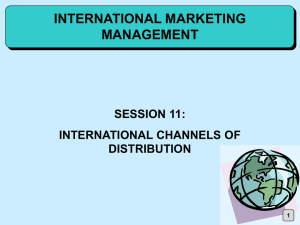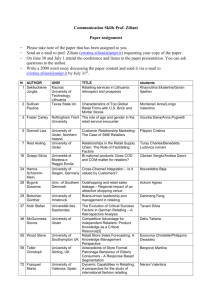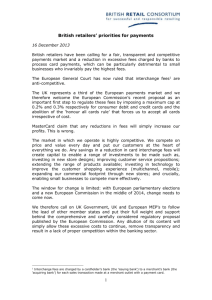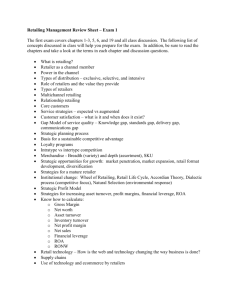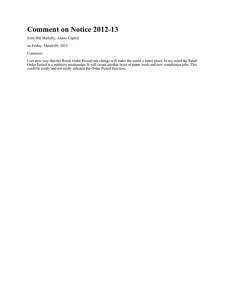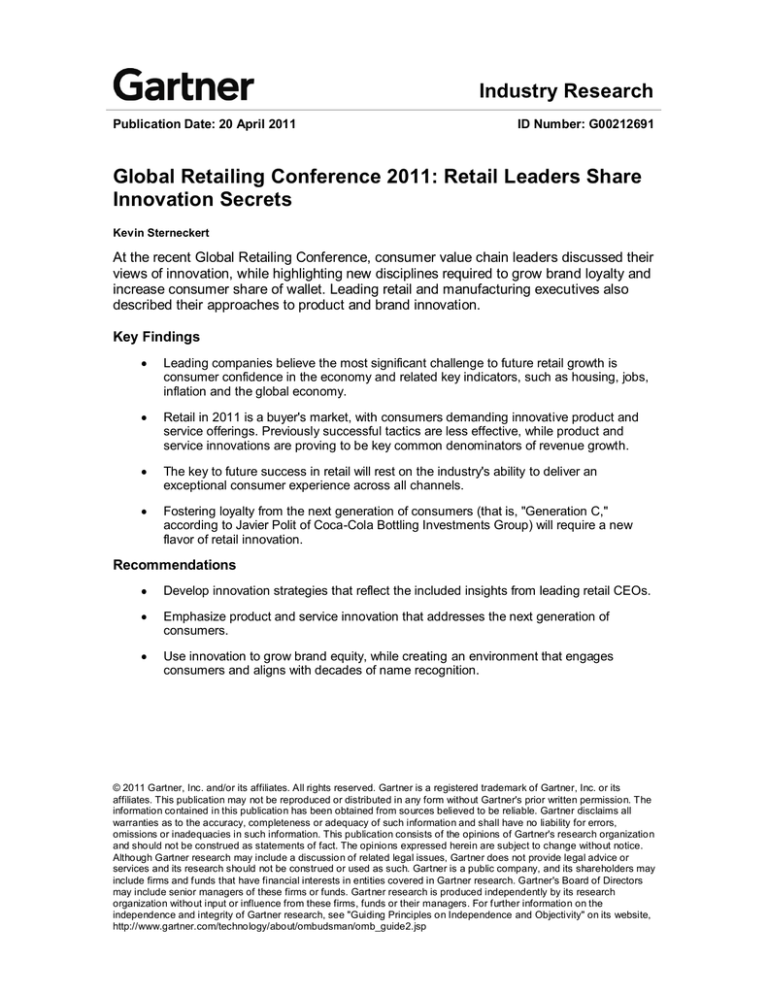
Industry Research
Publication Date: 20 April 2011
ID Number: G00212691
Global Retailing Conference 2011: Retail Leaders Share
Innovation Secrets
Kevin Sterneckert
At the recent Global Retailing Conference, consumer value chain leaders discussed their
views of innovation, while highlighting new disciplines required to grow brand loyalty and
increase consumer share of wallet. Leading retail and manufacturing executives also
described their approaches to product and brand innovation.
Key Findings
Leading companies believe the most significant challenge to future retail growth is
consumer confidence in the economy and related key indicators, such as housing, jobs,
inflation and the global economy.
Retail in 2011 is a buyer's market, with consumers demanding innovative product and
service offerings. Previously successful tactics are less effective, while product and
service innovations are proving to be key common denominators of revenue growth.
The key to future success in retail will rest on the industry's ability to deliver an
exceptional consumer experience across all channels.
Fostering loyalty from the next generation of consumers (that is, "Generation C,"
according to Javier Polit of Coca-Cola Bottling Investments Group) will require a new
flavor of retail innovation.
Recommendations
Develop innovation strategies that reflect the included insights from leading retail CEOs.
Emphasize product and service innovation that addresses the next generation of
consumers.
Use innovation to grow brand equity, while creating an environment that engages
consumers and aligns with decades of name recognition.
© 2011 Gartner, Inc. and/or its affiliates. All rights reserved. Gartner is a registered trademark of Gartner, Inc. or its
affiliates. This publication may not be reproduced or distributed in any form without Gartner's prior written permission. The
information contained in this publication has been obtained from sources believed to be reliable. Gartner disclaims all
warranties as to the accuracy, completeness or adequacy of such information and shall have no liability for errors,
omissions or inadequacies in such information. This publication consists of the opinions of Gartner's research organization
and should not be construed as statements of fact. The opinions expressed herein are subject to change without notice.
Although Gartner research may include a discussion of related legal issues, Gartner does not provide legal advice or
services and its research should not be construed or used as such. Gartner is a public company, and its shareholders may
include firms and funds that have financial interests in entities covered in Gartner research. Gartner's Board of Directors
may include senior managers of these firms or funds. Gartner research is produced independently by its research
organization without input or influence from these firms, funds or their managers. For further information on the
independence and integrity of Gartner research, see "Guiding Principles on Independence and Objectivity" on its website,
http://www.gartner.com/technology/about/ombudsman/omb_guide2.jsp
WHAT YOU NEED TO KNOW
Leading retail executives shared their innovation secrets at a unique two-day conference.
Companies aspiring to achieve growth and accelerate brand equity should carefully examine the
outlined points within this research, and identify their strategies to expand and refine approaches
to achieving growth in a retail environment driven by consumer demand. Gartner is prepared to
discuss additional details related to these activities with interested companies.
EVENT
Event Facts
On 7 through 8 April 2011, 250 retailers and manufacturers attended the Terry J. Lundgren
Center for Retailing and Norton School of Family & Consumer Sciences event, Global Retailing
Conference 2011, which was held in Tucson, Arizona. With significant annual attendee growth
year over year, the Global Retailing Conference promises to become a "must-attend" event for
retailers and manufacturers alike.
Analysis
Tucson was an unlikely site for an unparalleled gathering of leading retail innovators. Over the
course of two days, some of the most recognizable names in retail — each speaker would easily
qualify for keynote spots at other industry events — shared their experiences with product, brand
and consumer innovation. The central theme was "Inspiring Innovation." Insights were delivered
by Terry Lundgren (president and CEO, Macy's), Martha Stewart (founder, Martha Stewart
Living), Mike George (president and CEO, QVC), Javier Polit (CIO, Coca-Cola Bottling
Investments Group), Barbara Turf (president and CEO, Crate and Barrel), Raul Vazquez
(executive VP, global e-commerce, Walmart), Susan Lyne (Chairman, Gilt Groupe), Michael
Archbold (executive VP and COO, Vitamin Shoppe), Claudio Del Vecchio (CEO, Brooks
Brothers), and Tommy Hilfiger (principal designer and visionary, Tommy Hilfiger Group).
Although this was certainly an impressive group of speakers, their looks into their respective
companies were even more valuable and insightful. Each presenter related common experiences
of a point in time when their companies experienced growth challenges. Some experienced this
during the recession of 2009 — others prior to the downturn. Throughout their stories, messages
of innovation demonstrated how companies can thrive in retail through differentiated products and
services that attract and retain consumers. The shared message was "innovate or die."
Leading the conference, Lundgren opened the event by asking an audience of more than 250
retailers a set of telling questions. The first question posed to the attendees was, "To ensure
future success, my key organizational efforts are focused on what?" Here are the responses as a
percentage of the total:
Branding — 16%
Consumer experience — 46%
Environment — 13%
Hispanic marketing — 3%
Multichannel retailing — 18%
Social mobile response — 4%
Publication Date: 20 April 2011/ID Number: G00212691
© 2011 Gartner, Inc. and/or its Affiliates. All Rights Reserved.
Page 2 of 6
Joining the presenters, retailers and manufacturers agreed in this interactive survey that the
future of their success will be found in how they shape the consumer experience. "The 2010
Retail Handbook for Becoming Demand-Driven" emphasizes the importance of understanding
consumer demand and creating capabilities that deliver an experience the consumer expects.
This research illustrates the five strategies companies can use to drive an improved consumer
experience.
As a follow-up question, Lundgren asked the audience, "What's driving innovation?" The
audience responded with the following:
Technology — 34%
Globalization — 12%
Shareholders — 8%
Customer demand — 37%
Speed to market — 6%
Sustainability — 3%
With these results, we see that the consumer is in the driver's seat. Certainly, retail has
experienced a decrease in overall consumer spending. This smaller pie, with an increased
number of retailers (bricks and mortar combined with online), equates to a fiercely competitive
environment where the consumer is king.
Lundgren shared that Macy's expects strong, comparable store sales for 2011, with an even
more impressive online revenue growth of 30%. His advice to retailers: Create events that are
spontaneous and random, with a potential to create "flash mob" experiences. Macy's most noted
flash mob event occurred at the Macy's Center City Philadelphia location in December, when the
local opera company began singing the "Hallelujah" chorus, accompanied by the Wanamaker
Organ, the world's largest pipe organ. Hundreds of employees and customers began singing
along. The holiday season was enhanced within the store with this random flash mob event.
Lundgren emphasized, "While delivering these experiences, it's vitally important to make sure you
align these events with your brand."
Martha Stewart provided an insider's view to her media company, revealing that most of the
products within its design portfolios are inspired by everyday items found throughout her
everyday life experiences. For example, her line of paints was inspired by colored eggs laid by
her own chickens. On the opposite spectrum, her line of fine dinnerware was inspired by a "wall
of china" found in one of her 13 kitchens. Stewart's innovation advice to retailers: Your product
extensions must align with your core values, while focusing on individual consumers. She shared
questions she asked one designer about a tea cup, after she noticed the handle was small for her
hands: "Could you use this handle? Is it comfortable? Would you buy this?" With a single
negative response, she directed her creative designer to go back to the drawing board. "If we
wouldn't buy it — if we wouldn't crave it — we need to redesign it."
Mike George, president and CEO of QVC, began his remarks with his view of innovation: "If it can
be free, it will be. If it can be known, it will be. If it can be read, it will be." These guiding truisms
lead QVC to understand the power of free, and that value has gone to the consumer in the
current buyer's market.
In the sea of e-commerce, many have asked George, "Who will shop via their TVs in the future?"
QVC believes its innovative approach will continue to attract consumers as it changes the way it
delivers its shopping experience. QVC, for instance, has an iPad application that streams live
Publication Date: 20 April 2011/ID Number: G00212691
© 2011 Gartner, Inc. and/or its Affiliates. All Rights Reserved.
Page 3 of 6
broadcasts, offers special deals, gives access to existing deals, delivers search by item or
category and includes a number of additional innovative features.
George offered seven key activities QVC practices every day to stay relevant with its consumers:
1. Focus on curating compelling products that are relevant to consumers
2. Curating compelling content matters, too
3. Eliminate channel silos and refocus on the consumer life on multiple screens
4. Let the community share the experience
5. Use scale to personalize, not standardize
6. Tap into the global consumer
7. It's still all about trust
Finally, emphasizing activity No. 7, George knows from his experience, "If you've made three
purchases from QVC, you will be a customer for life." QVC, he said, works overtime to earn and
win consumer trust every day.
Javier Polit, CIO for Coca-Cola Bottling Investments Group, referenced the next generation of
consumers, naming them "Generation C." He shared that these consumers are connected and
communicating, content-centric, computerized, community-organized, always clicking and that
they lived their adolescence in years after 2000. Understanding this, Polit said, is the key
challenge as Coca-Cola innovates to avoid losing what took 125 years to build in 125 seconds.
Through its focus on innovation, Coca-Cola is striving to offer consumers choices that distinguish
the brand from others, while, at the same time, protecting its iconic brand.
His innovation advice to retailers included the following:
Maintain an active innovation pipeline
Maintain closeness to the business
Understand that mobility is a key component
Make sure intelligence is actionable
Realize that monitoring must be best in class to secure and maintain devices
Barbara Turf, president and CEO of Crate and Barrel, shared how she's focusing her company on
innovation and relevance. Her objectives with consumers are to "connect, ensure and convert."
She expressed her belief that there will be winners and losers in the future based on how well
companies succeed in these areas. Further, she sees sales pressure to perform as product
choice and substitution continue to increase. She shared her expectation that retail will
experience margin pressure as customer acquisition and retention costs rise. The answer to
these difficult conditions rests with innovation that provides differentiation in the marketplace.
Turf reminded the audience of a Charles Darwin quote: "It is not the strongest of the species that
survives, nor the most intelligent that survives. It is the one that is most adaptable to change."
The retail landscape has been littered with hundreds of companies over the past several years
where a lack of change led to their demise. To emphasize the importance of innovating now, Turf
quoted Winston Churchill: "The era of procrastination, of half-measures, of soothing and baffling
expedients, of delays, is coming to a close. In its place we are entering a period of
consequences." Her message? Innovate now or die.
Publication Date: 20 April 2011/ID Number: G00212691
© 2011 Gartner, Inc. and/or its Affiliates. All Rights Reserved.
Page 4 of 6
Susan Lyne, chairman of Gilt Groupe, discussed her approach to innovation through
personalizing the customer experience. Gilt.com is positioned as a lifestyle brand, where
consumers are presented with coveted brands, a delightful shopping experience, no discounts,
access to goods that are available no other way, and through a Web offering that is very
personalized. She believes e-commerce success rests with these tenets. The shopping
experience must be all of the following:
Addictive and fun
About curating unique and special products
Addressing wants over needs
Tempting — the visual experience must be incredible
Directed at lifestyle merchandising
Including an essence of discovery or a treasure hunt
Creating a viral environment where consumers want to repeat visits and purchases
Generating raving fans
One interesting note about Gilt.com that Lyne shared was that the site traffic originates in daily emails, not through Web searches. These e-mails are personalized and intended to focus on the
specific wants of Gilt's exclusive membership-driven consumers. Aiding in the process of
personalization, Gilt.com uses two sophisticated regression models each night, focusing on what
was browsed and what was purchased to aid in predictive marketing for the next day's special
product offerings. The mobile experience is driving a significant share of revenue for the Gilt
Group's e-commerce properties.
Here are Lyne's mobility lessons learned through success at Gilt.com:
Mobile should not be replicated from an online Web experience. Retailers must make it
better, simple, fast and fun.
Optimize for weekends and downtimes (holidays).
Deliver speed, stability and scalability.
The speakers and attendees seemed to share cautious optimism of retail performance during the
next few years. Retailers heard a reoccurring theme through a number of specific examples that
companies can win through product and service innovation. And even though you may not win
with every attempt, but similar to many who can deliver true innovation, winning is an
accumulative result of activities that deliver a competitive advantage and favorable share of the
consumer's wallet.
RECOMMENDED READING
Some documents may not be available as part of your current Gartner subscription.
"Toolkit: Assess Your Retail Value Chain Maturity Against the Five Demand-Driven Strategies"
"The 2010 Retail Handbook for Becoming Demand-Driven"
Publication Date: 20 April 2011/ID Number: G00212691
© 2011 Gartner, Inc. and/or its Affiliates. All Rights Reserved.
Page 5 of 6
REGIONAL HEADQUARTERS
Corporate Headquarters
56 Top Gallant Road
Stamford, CT 06902-7700
U.S.A.
+1 203 964 0096
European Headquarters
Tamesis
The Glanty
Egham
Surrey, TW20 9AW
UNITED KINGDOM
+44 1784 431611
Asia/Pacific Headquarters
Gartner Australasia Pty. Ltd.
Level 9, 141 Walker Street
North Sydney
New South Wales 2060
AUSTRALIA
+61 2 9459 4600
Japan Headquarters
Gartner Japan Ltd.
Aobadai Hills, 6F
7-7, Aobadai, 4-chome
Meguro-ku, Tokyo 153-0042
JAPAN
+81 3 3481 3670
Latin America Headquarters
Gartner do Brazil
Av. das Nações Unidas, 12551
9° andar—World Trade Center
04578-903—São Paulo SP
BRAZIL
+55 11 3443 1509
Publication Date: 20 April 2011/ID Number: G00212691
© 2011 Gartner, Inc. and/or its Affiliates. All Rights Reserved.
Page 6 of 6


